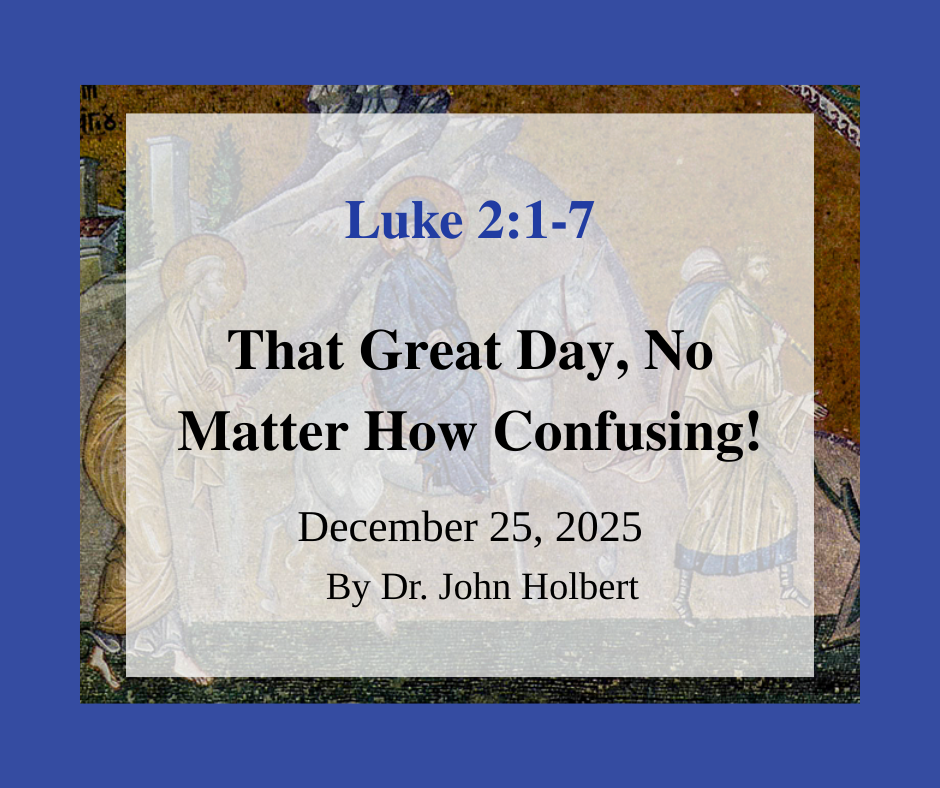That Great Day, No Matter How Confusing! Reflections on Luke 2:1-7, Christmas Day, Year A
by John C. Holbert on Wednesday, October 22, 2025

I know many of you will not conduct services on Christmas Day which this year falls on a Thursday, but I cannot resist writing at least a brief article on Luke 2. I hardly have anything to add to the voluminous commentary expended on these famous words, but as it is said, every person offers something different in a sermon or a commentary simply because every person is unique. So, since I am unique, as are you, here are my thoughts about Luke 2. I trust you will add your own.
There is no denying that Luke, however good a theologian, is a lousy historian. His desire is to connect his tale of the birth of the Messiah, as he believes Jesus to be, with the wider world’s story. His use of the word oikoumene suggests that he either intends it to refer to the “known world,” which it surely can, or merely to the empire of Rome. Given his very large design and intention for his Gospel, I think he means “known world,” thus giving the birth its world historical context. However, when Luke attempts to make sense of the dating of the birth in order to place it into the world’s time structure, he is only confusing. Herod the Great dies in 4 BCE, and Augustus was emperor from 27BCE to 14CE. He is on safe ground so far. Unfortunately, Quirinius was Syrian governor from 6-7CE. Thus, you see the problem: Jesus was supposedly born while Herod was alive, and his family went to be registered in Bethlehem before his birth while Quirinius was governor—a gap of some 10 or 11 years! Such confusion makes it all the better that Luke tells those fabulous parables later!
Another important note in the story is Jesus’s connection to David, the most important king in the history of Israel. Why is this a crucial bit of information? At every opportunity Luke brings David into his story. At 1:27, 32, 69, and 2:11, we hear of Jesus’s relationship to David. The memory of David obviously far transcends the sordid tale we hear when reading 1 and 2 Samuel in the Hebrew Bible. David is, by the first century, the representative of the days of Israel’s greatness, the time when YHWH was most present with the chosen people, when Israel’s future was bright, when their relationship with YHWH was closest. In addition, David was remembered as the “sweet singer of Israel,” composer of psalms, player of genius on the harp, and according to the Chronicler, conductor of the choirs of the temple. Little wonder when the crowds hail Jesus as he enters Jerusalem on that famous donkey as “Son of David!”
Luke makes it clear that Mary was Joseph’s “betrothed,” not his wife. However, as Luke 1:27 makes plain, referring to Deut.22:23, betrothal is already a binding commitment; “wife” may have been an appropriate term, but Luke avoids it, perhaps to emphasize the remarkable miracle of the virginal birth of Jesus. If Mary is not yet wife of Joseph, it is unlikely that they have cohabited; hence, Joseph cannot be the father. When Joseph and Mary arrive at Bethlehem, she nearly immediately gives birth to her “first-born son” (prototokos). The use of that word establishes important religious echoes with Israel: see Exodus 4:22-23; Jer.31:9.
Mary wraps Jesus in “cloth strips,” though KJV’s “swaddling clothes” clings to all our memories. Nonetheless, bands of cloth were wrapped around newborns in order to keep limbs straight. The Vulgate Latin reads here pannus, or “rags”. The now bound Jesus is “placed in a manger,” which could be either an open animal feeding area or a kind of trough; tradition often chooses the latter possibility in its reconstructions. This makeshift crib or open place for sleeping is necessitated, “because they had no place in the lodging area” (Luke 2:7). The famous “inn” (KJV) with its hard-hearted innkeeper who banishes the couple to the stall, is romanticized in Christmas plays, but is perhaps only an unlikely fabrication. The Greek kataluma means “lodging area;” in Luke 22:11 it refers to a space in a house, but it could also mean an open area for animals and human gatherings. The common idea that animals gathered around the trough where the newborn lay perhaps arises from a Christianized reading of Is.1:3, though many apocryphal accounts contain this touching idea. Indeed, the lovely poem by Thomas Hardy, “Christmas Eve,” set to winsome music by Ralph Vaughn Williams in his cantata, “Hodie,” weaves a delightful spell at any Christmas service. I have sung the piece many times on such occasions.
The magic of this familiar tale cannot be undone. No matter how many notions have been added or fabricated, Luke’s story of the birth of Jesus remains a crucial element in the ongoing story of the gospel. Even if you do not hold services on Christmas Day, I imagine you will find ways to present this timeless tale, either in sermon, song, or play this year—and every year.
